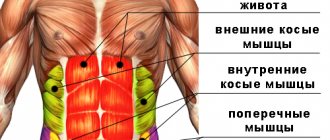The following aspects are important for losing weight:
- Workout. Physical activity is mandatory for fat loss.
- Nutrition. Proper nutrition is the basis of a good figure.
- The right attitude. Psychological problems often prevent you from making your body beautiful.
- Your surroundings. Many people underestimate the influence of their environment. The people who surround you influence you. Accept it.
What happens if you stick to a diet, do exercises, if you are supported by your environment, and your attitude towards results can only be envied, but at the same time you do not lose weight? Perhaps the reason lies deeper. Perhaps it's a matter of physiology. There are factors that may prevent you from losing weight even at this level.
There are four physiological aspects to pay attention to:
- oxygen delivery;
- blood sugar level;
- system for the release and breakdown of adrenaline;
- digestive system.
Let's be honest. In 85% of cases, people lose weight by following a diet and doing exercises. Some are faster, some are slower. But there are 15% of people who do everything required and do not lose weight. What's the matter? Let me make an analogy. Our body is like a garden. Sun and water mean training and healthy eating. But if you plant a garden in sick soil, you will not get fruit. Let's look at what problems there may be with our soil, with our physiology.
Wrong workouts
In order to lose weight, you need to exercise 5-6 times a week, so that your heart rate corresponds to the Fat Burning Zone for 30-45 minutes. Start with slow exercises and gradually increase the pace, but if you are in good physical shape and have no restrictions, you can move up to intense training as this is the best way to burn more calories. Add interval training to ensure you keep burning calories even after you've finished exercising.
In addition to cardio, be sure to strength train all major muscle groups on at least 2 non-consecutive days per week. You need to use a weight that would allow you to do the required number of repetitions of the exercise and not one more.
Reason #9: You're choosing the wrong foods.
In order to lose weight, many people try to replace unhealthy foods with healthy ones. But it's not always successful. For example, white polished rice is as healthy and dietary as semolina. It sharply raises blood sugar levels and makes you feel full. But then your sugar level drops, and you think about eating it again.
Binge eating
If you don't constantly track every calorie you eat, you'll end up eating a lot more than you think.
Favorite foods high in fat and carbohydrates trigger the production of the pleasure hormone and make us slaves to our taste preferences. Therefore, if you are really serious about losing weight, you need to be very careful about what you eat. Keep a detailed food journal, and for a week, without changing your usual eating habits, enter everything you eat, indicating not only the amount, but also the emotions you experience while eating. Be as specific as possible in your entries, paying attention to calorie counts and nutrient content of your diet. You will be surprised how unnoticed extra calories manage to slip into your body with seemingly innocent portions of something tasty.
You also need to keep in mind that your metabolism slows down as you age if you don't maintain muscle mass. Muscle mass decreases by about 4% every 10 years from age 25 to 50. This means that if you eat the same caloric intake as 10 years ago, then over time, the weight may slowly increase, although previously the same diet allowed you to stay in shape. Add strength training to your fitness plan to keep your metabolism in check.
The first barrier to losing weight. Poor oxygen delivery
The cells in our body use primarily two types of fuel: oxygen and glucose. If there is a problem with any of these, then hundreds of millions of our cells will not work correctly. The cells in our body produce ATP, which stands for adenosine triphosphate. ATP is the basic energy resource of our body, which allows every cell in our body to perform its functions. Without it, correct work at the cellular level is impossible. In fact, decreased ATP production is one of the hallmarks of the aging process.
Although there are many nutrients that are needed to produce ATP, one of the most important components is oxygen. If your cells don't get enough oxygen, nothing in your body will work correctly, including weight loss. In traditional medicine, a decrease in the ability to supply oxygen to cells is often called anemia. This condition is associated with a quantitative and/or qualitative inability of red blood cells to deliver oxygen to the tissues and organs of the body.
If you suspect such problems, you should consult a doctor. Based on the results of blood tests, conclusions can be drawn about the state of your oxygen delivery system. And in case of problems, the doctor will prescribe you the correct treatment.
Lack of sleep
Lack of sleep can contribute to weight gain because sleep deprivation is associated with metabolic changes that can lead to overeating and obesity.
If you sleep too little, the body perceives this as excessive workload and stress, which provokes the production of the stress hormone cortisol, which, in turn, leads to increased insulin production and, as a result, weight gain.
What to do?
If you want to lose weight, you need to find a way to get good sleep. We must also keep in mind that lack of sleep affects not only our physical, but also our emotional state. Lack of sleep usually results in you not feeling rested, tired, and negative emotions, even depression. This emotional state is dangerous in itself, regardless of whether you are on a diet or not.
You don't get enough sleep
Svetlana Nezvanova
I have been working for more than 12 years and have my statistics from practical experience. And the most complex in terms of metabolism and the level of active cell mass are people who have sleep disorders. Programmers, residents of megacities, those who have night schedules.
Reduced sleep affects Interactions between sleep, stress, and metabolism: From physiological to pathological conditions on the secretion of hormones responsible for hunger and satiety: leptin and ghrelin. Just two nights of 4 hours of rest increases appetite by 23% and also causes cravings for sweets. As a result, you feel more hungry and eat high-calorie foods or suffer from the inability to do so.
Six nights of 4 hours of sleep increases levels of cortisol, a stress hormone that interferes with fat burning and retains water in the body. And a week of 5-hour night rest significantly reduces Sleep Restriction for 1 Week Reduces Insulin Sensitivity in Healthy Men insulin sensitivity.
Lack of sleep not only slows down weight loss, but also has a bad effect on its quality. Thus, in one study, Insufficient Sleep Undermines Dietary Efforts to Reduce Adiposity, people who slept 5 hours a night lost 55% less fat and 60% more muscle than those who rested 8.5 hours.
What to do about it
Try to sleep at least 7-8 hours a day, and go to bed in the first half of the night - no later than 2:00. As Svetlana Nezvanova says, from 10 pm until this time the body synthesizes two important hormones: melatonin and somatotropic hormone, which are associated with metabolism and fat burning.
If you are used to going to bed long after midnight, the level of these hormones drops, and cortisol increases, which negatively affects body composition and the rate of weight loss.
Stress
Can't lose weight despite strict diets and intense exercise? Perhaps it's stress. Stress and weight always go hand in hand. Although you may not be aware of it, stress causes an increase in the production of the hormone cortisol, which increases appetite and promotes the accumulation of additional fat deposits in the abdominal area. This, in turn, increases the risk of diabetes and cardiovascular disease, high cholesterol and other health problems.
What to do?
Reducing your stress levels is actually much easier than it seems. All you need is to find a few minutes a day to distract yourself, relax and unwind. You can choose to meditate, or read your favorite magazine, or get a massage before bed. It doesn’t matter what it is, the main thing is that in such moments you experience peace and joy. Just do what you enjoy and your stress levels will go down.
You have high stress levels
Svetlana Nezvanova
High stress levels definitely hinder weight loss. With chronic debilitating stress, cortisol and insulin levels will be constantly elevated, which will prevent you from burning fat. Years of stress can lead to adrenal fatigue syndrome, hormonal imbalances and decreased metabolism.
Stress also reduces the amount of the hormone adiponectin, which is involved in the breakdown of fat, and increases A Link Between Sleep Loss, Glucose Metabolism and Adipokines levels of interleukin-6 (IL-6) and tumor necrosis factor (TNF-α), which can cause chronic inflammation. insulin resistance and diabetes.
In addition, the more stress you experience, the less Daily Stressors, Past Depression, and Metabolic Responses to High‑Fat Meals: A Novel Path to Obesity you spend energy after eating and the worse your body oxidizes fats. If you had a strong negative experience yesterday, today you will burn about 104 kcal less than if everything was fine. This difference can result in a 5 kg increase per year.
What to do about it
If you can't remove the source of stress, try changing your reaction to events. Yoga classes, meditation, breathing techniques - all this helps to react more calmly to external stimuli. For example, in one study, Impact of a stress management program on weight loss, mental health and lifestyle in adults with obesity: a randomized controlled trial, an eight-week stress management program helped participants lose almost twice as much weight as people in the control group.
Visualization, diaphragmatic breathing, and muscle relaxation are all techniques that not only help you lose weight, but also improve your self-esteem and mood, relationships with friends and colleagues, and your performance at work.
Inconsistency
In order for your exercises to have an effect, you must exercise regularly. Otherwise, what happens is that the body adapts to the loads that your exercise program provides and is ready to adapt to more intense training. At this time, you begin to skip classes and the load decreases, which forces your body to rebuild again and adapt to reduced physical activity.
This way, if you miss too many workouts, it's like starting all over again the next time you decide to exercise. Create a physical activity program that you enjoy, making sure it fits your lifestyle, goals and needs. It's better to be a realist about what you can actually accomplish than to constantly dream about how it should be.
Abuse
You may have created a weight loss plan that allows you to lose 2 kg of weight per week, but at the same time you must significantly reduce your caloric intake and exercise every day. If you follow such a plan, you will very soon feel tired and frustrated from having to constantly control yourself, which can lead to a breakdown.
What to do?
Try following a different path. Do fitness and limit calories 5 days a week, and on the weekends allow yourself to relax, eat something tasty, and take a break from training. If you follow this path, it will be like taking two steps forward and one step back. The movement towards the goal will still continue, and the big advantage of this approach is to plan your relaxations and allow the body to rest and adapt to new conditions. Allow yourself little joys and reward yourself with prizes in the form of pleasant food and days of rest, this is guaranteed to help you stay on the diet as long as planned.
Excessive loads
We often hear that to lose excess weight you need to exercise a lot and regularly. The more we exercise, the more calories we burn. In light of this, it seems strange to discuss the importance of rest between workouts.
When we exercise, our muscles become tired as muscle protein begins to break down. The more we push ourselves, the more breakdown occurs, and this is one of the reasons why we become weaker and weaker as we exercise. The rate of muscle degradation depends on your level of fitness and the intensity of the exercise. Obviously, the fitter you are initially, the slower the rate of breakdown, and increasing the intensity of exercise leads to an increase in this rate. This is the reason that we can easily walk all day long, while running without stopping for a long time is extremely difficult.
After training, your muscles need time to replenish lost protein and energy costs and fully recover. If we don't give ourselves enough rest to recover before the next workout, our muscles become smaller and smaller. A decrease in muscle mass, in turn, leads to a slowdown in metabolism, which of course does not contribute to the process of losing weight. So don't underestimate the importance of rest between workouts; it's one of the key factors in helping you consistently lose weight.
Reason seven: You're not being honest with yourself.
Even when calculating the calorie content of breakfast, lunch, afternoon snack, and dinner, we can inadequately estimate the total daily caloric intake. We can actually forget about all the foods that ended up in our stomach during the day. Do you remember munching on a couple of cookies a colleague offered you? Did you try the dish several times while preparing it? Did you pinch off a piece of bread? Or does it “not count”?
What to do?
Keep a food diary. Or – what’s easier – make notes directly on your phone, since most of us always have it with us. Write down everything you eat right away, without leaving it for later. All this data will help to adequately estimate your total calorie intake.
Diseases that interfere with weight loss
Some diseases and medications can contribute to weight gain. You should pay attention to this if you are actively involved in sports and strictly adhere to your diet, but the weight, nevertheless, does not go away.
One of the reasons may be thyroid disease. They often lead to a decrease in metabolism and, as a result, weight gain.
Weight gain can also occur as a side effect of certain medications. These include hormonal medications often used as contraceptives or during menopause, some antidepressants, and antidiabetic medications. Check with your healthcare provider to find out if you have a medical condition that causes weight gain or if you are prescribed medications that may cause it.
You have reached the plateau effect
Almost anyone who has ever tried to lose weight will sooner or later experience the “plateau” effect. When this happens, despite all your efforts, the weight does not decrease, and it may even increase slightly.
What to do?
If this happens, the most important thing is not to despair! Don't try to increase your exercise or cut more calories than your diet plan allows. During the plateau period, these actions will not lead to the desired result. In this case, changing the type of your training will most likely help (for example, for a while you can switch from step dancing to swimming) and switching to a different diet (if you are using a low-calorie diet, try one week on the Kremlin diet). Later, when the weight starts to come off again (which it certainly will in 1-2 weeks), you can return to your normal plan.
Eighth reason: you drink little water
You drink juices (freshly squeezed), tea (green, without sugar), coffee with a fat-burning effect, believing that there is enough liquid. Meanwhile, only ordinary, clean water is a catalyst for metabolic processes, and all other liquid can be equated rather to food.
What to do?
Drink water before breakfast, and 20 minutes before meals, but not immediately after meals. You need to drink at least two liters of clean, still water per day. Only in this case will the process of burning calories go faster.
Can't lose weight? You don't need to!
Despite the standards of thinness that are imposed on us by fashion magazines and advertising brochures for weight loss products, not all of us need to lose weight. In fact, only a few people have a correct idea of what a healthy weight should be. We all have different body shapes and shapes, and although we can make changes to our bodies, we cannot completely rebuild them.
Is your BMI not within the normal range? Or is your weight far from ideal? If so, then you really need to lose weight to be a healthy and energetic person. But if you're close to your goal and you're a couple of pounds away from your ideal weight, ask yourself if you really need to lose weight. Perhaps you feel happy at your current weight, and there is no need to torture your body by adjusting it to dubious beauty standards.











